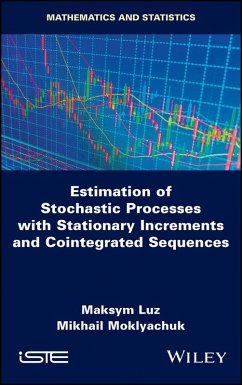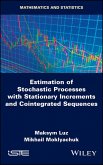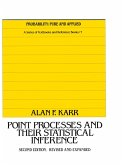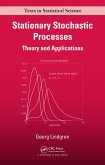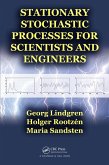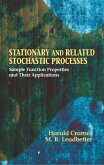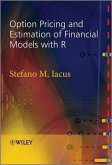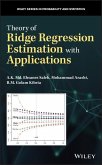Estimation of Stochastic Processes with Stationary Increments and Cointegrated Sequences (eBook, ePUB)


Alle Infos zum eBook verschenken

Estimation of Stochastic Processes with Stationary Increments and Cointegrated Sequences (eBook, ePUB)
- Format: ePub
- Merkliste
- Auf die Merkliste
- Bewerten Bewerten
- Teilen
- Produkt teilen
- Produkterinnerung
- Produkterinnerung

Hier können Sie sich einloggen

Bitte loggen Sie sich zunächst in Ihr Kundenkonto ein oder registrieren Sie sich bei bücher.de, um das eBook-Abo tolino select nutzen zu können.
Estimation of Stochastic Processes is intended for researchers in the field of econometrics, financial mathematics, statistics or signal processing. This book gives a deep understanding of spectral theory and estimation techniques for stochastic processes with stationary increments. It focuses on the estimation of functionals of unobserved values for stochastic processes with stationary increments, including ARIMA processes, seasonal time series and a class of cointegrated sequences. Furthermore, this book presents solutions to extrapolation (forecast), interpolation (missed values estimation)…mehr
- Geräte: eReader
- mit Kopierschutz
- eBook Hilfe
- Größe: 26.11MB
![Estimation of Stochastic Processes with Stationary Increments and Cointegrated Sequences (eBook, PDF) Estimation of Stochastic Processes with Stationary Increments and Cointegrated Sequences (eBook, PDF)]() Maksym LuzEstimation of Stochastic Processes with Stationary Increments and Cointegrated Sequences (eBook, PDF)139,99 €
Maksym LuzEstimation of Stochastic Processes with Stationary Increments and Cointegrated Sequences (eBook, PDF)139,99 €![Point Processes and Their Statistical Inference (eBook, ePUB) Point Processes and Their Statistical Inference (eBook, ePUB)]() Alan KarrPoint Processes and Their Statistical Inference (eBook, ePUB)50,95 €
Alan KarrPoint Processes and Their Statistical Inference (eBook, ePUB)50,95 €![Stationary Stochastic Processes (eBook, ePUB) Stationary Stochastic Processes (eBook, ePUB)]() Georg LindgrenStationary Stochastic Processes (eBook, ePUB)103,95 €
Georg LindgrenStationary Stochastic Processes (eBook, ePUB)103,95 €![Stationary Stochastic Processes for Scientists and Engineers (eBook, ePUB) Stationary Stochastic Processes for Scientists and Engineers (eBook, ePUB)]() Georg LindgrenStationary Stochastic Processes for Scientists and Engineers (eBook, ePUB)94,95 €
Georg LindgrenStationary Stochastic Processes for Scientists and Engineers (eBook, ePUB)94,95 €![Stationary and Related Stochastic Processes (eBook, ePUB) Stationary and Related Stochastic Processes (eBook, ePUB)]() Harald CramérStationary and Related Stochastic Processes (eBook, ePUB)12,95 €
Harald CramérStationary and Related Stochastic Processes (eBook, ePUB)12,95 €![Option Pricing and Estimation of Financial Models with R (eBook, ePUB) Option Pricing and Estimation of Financial Models with R (eBook, ePUB)]() Stefano M. IacusOption Pricing and Estimation of Financial Models with R (eBook, ePUB)84,99 €
Stefano M. IacusOption Pricing and Estimation of Financial Models with R (eBook, ePUB)84,99 €![Theory of Ridge Regression Estimation with Applications (eBook, ePUB) Theory of Ridge Regression Estimation with Applications (eBook, ePUB)]() A. K. Md. Ehsanes SalehTheory of Ridge Regression Estimation with Applications (eBook, ePUB)111,99 €
A. K. Md. Ehsanes SalehTheory of Ridge Regression Estimation with Applications (eBook, ePUB)111,99 €-
-
-
Dieser Download kann aus rechtlichen Gründen nur mit Rechnungsadresse in A, B, BG, CY, CZ, D, DK, EW, E, FIN, F, GR, HR, H, IRL, I, LT, L, LR, M, NL, PL, P, R, S, SLO, SK ausgeliefert werden.
Hinweis: Dieser Artikel kann nur an eine deutsche Lieferadresse ausgeliefert werden.
- Produktdetails
- Verlag: John Wiley & Sons
- Seitenzahl: 320
- Erscheinungstermin: 25. September 2019
- Englisch
- ISBN-13: 9781119663508
- Artikelnr.: 58045483
- Verlag: John Wiley & Sons
- Seitenzahl: 320
- Erscheinungstermin: 25. September 2019
- Englisch
- ISBN-13: 9781119663508
- Artikelnr.: 58045483
- Herstellerkennzeichnung Die Herstellerinformationen sind derzeit nicht verfügbar.
0,n 43 3.4. Least favorable spectral densities in the class D
M,n 47 Chapter 4. Extrapolation Problem for Stochastic Sequences with Stationary nth Increments Based on Observations with Stationary Noise 53 4.1. The classical method of extrapolation with noise 53 4.2. Extrapolation of cointegrated stochastic sequences 71 4.3. Minimax (robust) method of extrapolation 75 4.4. Least favorable spectral densities in the class D0f × D0g 80 4.5. Least favorable spectral densities which admit factorization in the class D0f × D0g 82 4.6. Least favorable spectral densities in the class Duv × D
84 4.7. Least favorable spectral densities which admit factorization in the class Duv × D
86 Chapter 5. Interpolation Problem for Stochastic Sequences with Stationary nth Increments Based on Observations with Stationary Noise 89 5.1. The classical method of interpolation with noise 89 5.2. Interpolation of cointegrated stochastic sequences 96 5.3. Minimax (robust) method of interpolation 97 5.4. Least favorable spectral densities in the class D
0,f× D
0,g 100 5.5. Least favorable spectral densities in the class D2
1× D1
2 103 Chapter 6. Filtering Problem of Stochastic Sequences with Stationary nth Increments Based on Observations with Stationary Noise 107 6.1. The classical method of filtering 107 6.2. Filtering problem for cointegrated stochastic sequences 119 6.3. Minimax (robust) method of filtering 124 6.4. Least favorable spectral densities in the class D0f × D0g 129 6.5. Least favorable spectral densities which admit factorization in the class D0f × D0g 131 6.6. Least favorable spectral densities in the class Duv × D
134 6.7. Least favorable spectral densities which admit factorization in the class Duv × D
135 Chapter 7. Interpolation Problem for Stochastic Sequences with Stationary nth Increments Observed with Non-stationary Noise 139 7.1. The classical interpolation problem in the case of non-stationary noise 140 7.2. Minimax (robust) method of interpolation 148 7.3. Least favorable spectral densities in the class D
0,
× D
0,
150 7.4. Least favorable spectral densities in the class D
M,
×D
M,
153 Chapter 8. Filtering Problem for Stochastic Sequences with Stationary nth Increments Observed with Non-stationary Noise 155 8.1. The classical filtering problem in the case of non-stationary noise 156 8.2. Minimax filtering based on observations with non-stationary noise 170 8.3. Least favorable spectral densities in the class D0f × D0g 174 8.4. Least favorable spectral densities which admit factorizations in theclass D0f × D0g 175 8.5. Least favorable spectral densities in the class Duv × D
177 8.6. Least favorable spectral densities which admit factorizations in the class Duv × D
178 Chapter 9. Stationary Increments of Continuous Time Stochastic Processes: Spectral Representation 181 Chapter 10. Extrapolation Problem for Stochastic Processes with Stationary nth Increments 187 10.1. Hilbert space projection method of extrapolation 187 10.2. Minimax (robust) method extrapolation 205 10.3. Least favorable spectral densities in the class D0f × D0g 208 10.4. Least favorable spectral density in the class D0f 210 10.5. Least favorable spectral density which admits factorization in the class D0f 211 10.6. Least favorable spectral densities in the class Duv × D
213 10.7. Least favorable spectral densities which allow factorization in the class D
215 Chapter 11. Interpolation Problem for Stochastic Processes with Stationary nth Increments 217 11.1. Hilbert space projection method of interpolation 217 11.2. Minimax (robust) method of interpolation 226 11.3. Least favorable spectral densities in the class D0f × D0g 229 11.4. Least favorable spectral density in the class D0f 230 11.5. Least favorable spectral densities in the class D01/f × D01/g 231 11.6. Least favorable spectral density in the class D01/f 233 11.7. Least favorable spectral densities in the class Duv × D
234 11.8. Least favorable spectral density in the class Duv 235 11.9. Least favorable spectral density in the class D2
236 Chapter 12. Filtering Problem for Stochastic Processes with Stationary nth Increments 239 12.1. Hilbert space projection method of filtering 239 12.2. Minimax (robust) method of filtering 246 12.3. Least favorable spectral densities in the class D0f × D0g 248 12.4. Least favorable spectral densities in the class Duv × D
250 Problems to Solve 253 Appendix 259 References 267 Index 281
0,n 43 3.4. Least favorable spectral densities in the class D
M,n 47 Chapter 4. Extrapolation Problem for Stochastic Sequences with Stationary nth Increments Based on Observations with Stationary Noise 53 4.1. The classical method of extrapolation with noise 53 4.2. Extrapolation of cointegrated stochastic sequences 71 4.3. Minimax (robust) method of extrapolation 75 4.4. Least favorable spectral densities in the class D0f × D0g 80 4.5. Least favorable spectral densities which admit factorization in the class D0f × D0g 82 4.6. Least favorable spectral densities in the class Duv × D
84 4.7. Least favorable spectral densities which admit factorization in the class Duv × D
86 Chapter 5. Interpolation Problem for Stochastic Sequences with Stationary nth Increments Based on Observations with Stationary Noise 89 5.1. The classical method of interpolation with noise 89 5.2. Interpolation of cointegrated stochastic sequences 96 5.3. Minimax (robust) method of interpolation 97 5.4. Least favorable spectral densities in the class D
0,f× D
0,g 100 5.5. Least favorable spectral densities in the class D2
1× D1
2 103 Chapter 6. Filtering Problem of Stochastic Sequences with Stationary nth Increments Based on Observations with Stationary Noise 107 6.1. The classical method of filtering 107 6.2. Filtering problem for cointegrated stochastic sequences 119 6.3. Minimax (robust) method of filtering 124 6.4. Least favorable spectral densities in the class D0f × D0g 129 6.5. Least favorable spectral densities which admit factorization in the class D0f × D0g 131 6.6. Least favorable spectral densities in the class Duv × D
134 6.7. Least favorable spectral densities which admit factorization in the class Duv × D
135 Chapter 7. Interpolation Problem for Stochastic Sequences with Stationary nth Increments Observed with Non-stationary Noise 139 7.1. The classical interpolation problem in the case of non-stationary noise 140 7.2. Minimax (robust) method of interpolation 148 7.3. Least favorable spectral densities in the class D
0,
× D
0,
150 7.4. Least favorable spectral densities in the class D
M,
×D
M,
153 Chapter 8. Filtering Problem for Stochastic Sequences with Stationary nth Increments Observed with Non-stationary Noise 155 8.1. The classical filtering problem in the case of non-stationary noise 156 8.2. Minimax filtering based on observations with non-stationary noise 170 8.3. Least favorable spectral densities in the class D0f × D0g 174 8.4. Least favorable spectral densities which admit factorizations in theclass D0f × D0g 175 8.5. Least favorable spectral densities in the class Duv × D
177 8.6. Least favorable spectral densities which admit factorizations in the class Duv × D
178 Chapter 9. Stationary Increments of Continuous Time Stochastic Processes: Spectral Representation 181 Chapter 10. Extrapolation Problem for Stochastic Processes with Stationary nth Increments 187 10.1. Hilbert space projection method of extrapolation 187 10.2. Minimax (robust) method extrapolation 205 10.3. Least favorable spectral densities in the class D0f × D0g 208 10.4. Least favorable spectral density in the class D0f 210 10.5. Least favorable spectral density which admits factorization in the class D0f 211 10.6. Least favorable spectral densities in the class Duv × D
213 10.7. Least favorable spectral densities which allow factorization in the class D
215 Chapter 11. Interpolation Problem for Stochastic Processes with Stationary nth Increments 217 11.1. Hilbert space projection method of interpolation 217 11.2. Minimax (robust) method of interpolation 226 11.3. Least favorable spectral densities in the class D0f × D0g 229 11.4. Least favorable spectral density in the class D0f 230 11.5. Least favorable spectral densities in the class D01/f × D01/g 231 11.6. Least favorable spectral density in the class D01/f 233 11.7. Least favorable spectral densities in the class Duv × D
234 11.8. Least favorable spectral density in the class Duv 235 11.9. Least favorable spectral density in the class D2
236 Chapter 12. Filtering Problem for Stochastic Processes with Stationary nth Increments 239 12.1. Hilbert space projection method of filtering 239 12.2. Minimax (robust) method of filtering 246 12.3. Least favorable spectral densities in the class D0f × D0g 248 12.4. Least favorable spectral densities in the class Duv × D
250 Problems to Solve 253 Appendix 259 References 267 Index 281
